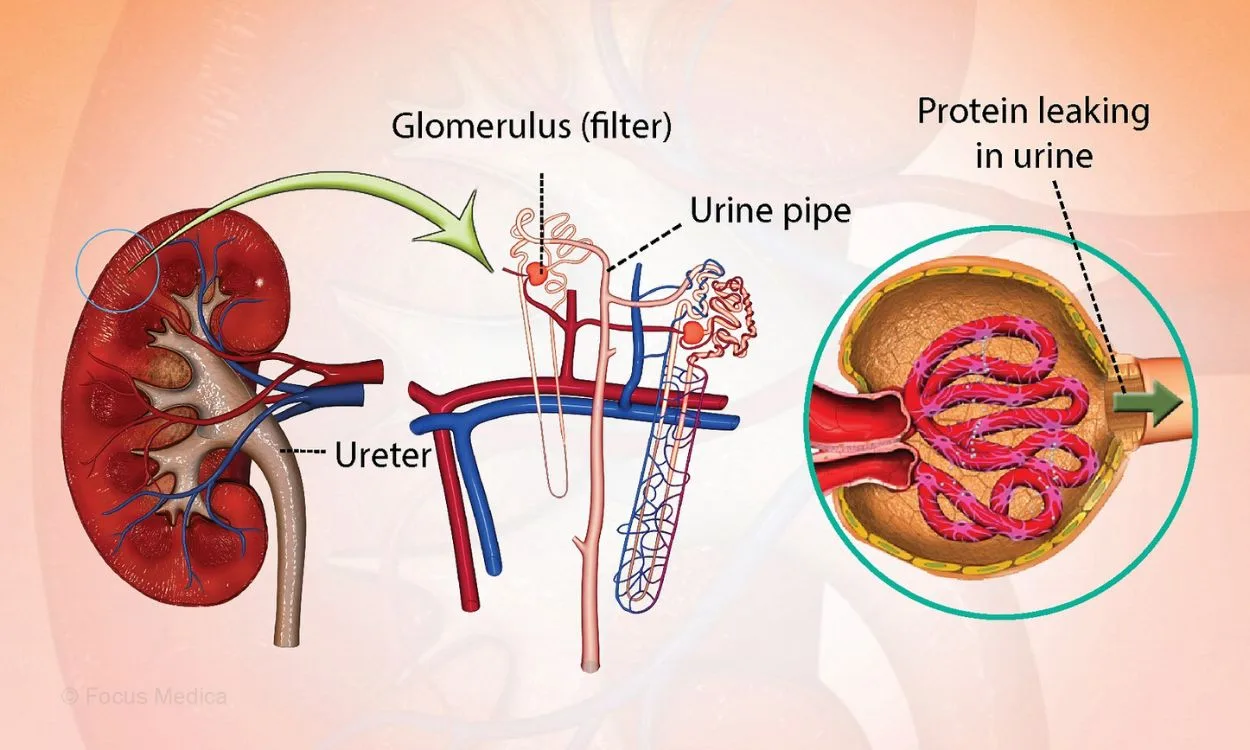How is Nephrotic Syndrome Diagnosed and Treated?
Nephrotic syndrome is a kidney disorder that causes the body to excrete too much protein in the urine, leading to edema, high cholesterol, and potentially other health issues. Here’s a detailed look at how nephrotic syndrome is diagnosed and treated:
Diagnosis of Nephrotic Syndrome:
- Clinical Assessment: The diagnosis typically begins with a review of the patient’s medical history, symptoms, and a physical examination to assess for signs of edema, high blood pressure, and fluid retention.
- Urine Tests: Urinalysis and 24-hour urine collection are used to measure protein levels in the urine, which is a key indicator of nephrotic syndrome.
- Blood Tests: Blood tests help assess kidney function, evaluate serum albumin and cholesterol levels, and detect underlying conditions such as diabetes or infections.
- Imaging Studies: Imaging tests like ultrasound, CT scans, or MRIs may be used to visualize the kidneys and identify any structural abnormalities or signs of kidney damage.
- Kidney Biopsy: In some cases, a kidney biopsy may be performed to examine a small sample of kidney tissue under a microscope to determine the underlying cause of nephrotic syndrome.
Treatment of Nephrotic Syndrome:
- Medications: Patients may be prescribed medications such as angiotensin-converting enzyme (ACE) inhibitors, angiotensin II receptor blockers (ARBs), diuretics, and statins to manage blood pressure, reduce proteinuria, and control cholesterol levels.
- Immunosuppressants: In cases where nephrotic syndrome is caused by an immune system disorder, immunosuppressive drugs like corticosteroids, cyclophosphamide, or rituximab may be used to suppress the immune response and reduce inflammation in the kidneys.
- Dietary Changes: A low-sodium diet, restriction of dietary protein, and sometimes even fluid intake may be recommended to alleviate edema and reduce the workload on the kidneys.
- Lifestyle Modifications: Patients are often advised to engage in regular physical activity, maintain a healthy weight, quit smoking, and manage any underlying conditions like diabetes or hypertension.
- Supportive Care: Close monitoring of kidney function, cholesterol levels, and blood pressure is essential. Additional support may include addressing complications like thrombosis, infections, and nutritional deficiencies.
The Fitpaa App – Your Companion for Health and Fitness:
Are you inspired to take charge of your health and embark on a journey towards overall wellness? With the Fitpaa app, you can achieve your health and fitness goals with guaranteed results. Here’s what Fitpaa offers to support your well-being:
- Personalized Fitpaa Capsule: Based on cutting-edge research and advanced technology, Fitpaa provides a personalized health and fitness plan tailored to your metabolism, lifestyle, and goals.
- Expert Guidance: Access a team of fitness coaches, nutritionists, and doctors who collaborate to design your Fitpaa Capsule and provide ongoing support and guidance.
- Comprehensive Tools: From real-time guidance and metabolism management technology to diet tracking and performance monitoring, the Fitpaa app equips you with everything you need to stay on track.
- Guaranteed Results: Fitpaa offers a goal-oriented service with a lifetime validity, ensuring that you achieve your health and fitness goals with a 100% guarantee.
Experience the joy of getting fit and excelling at life with the Fitpaa app. Request a trial today and let us help you towards your dream life. Your well-being is our mission!









